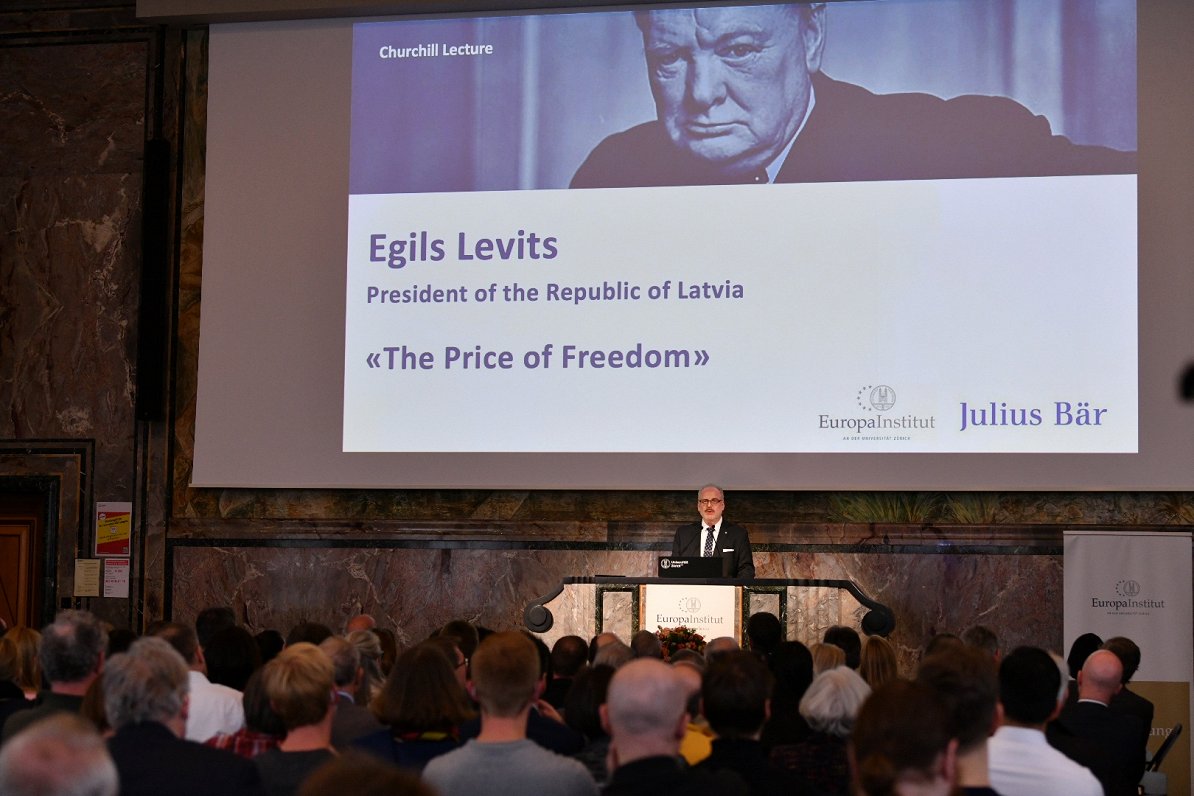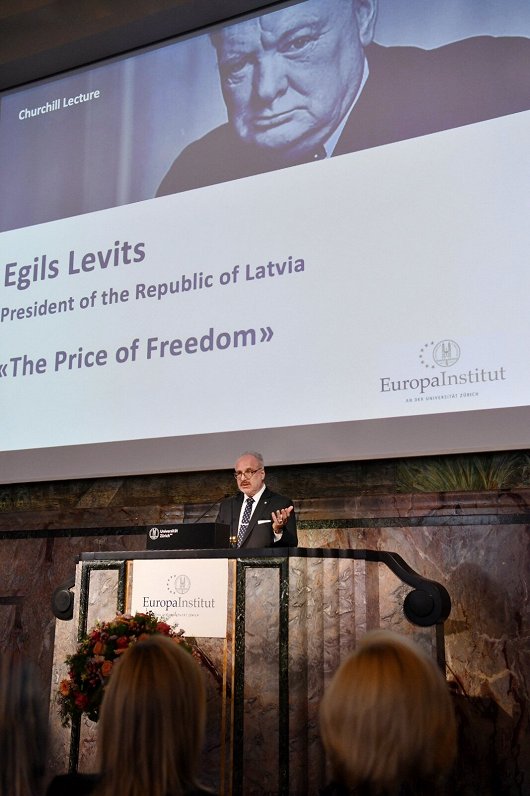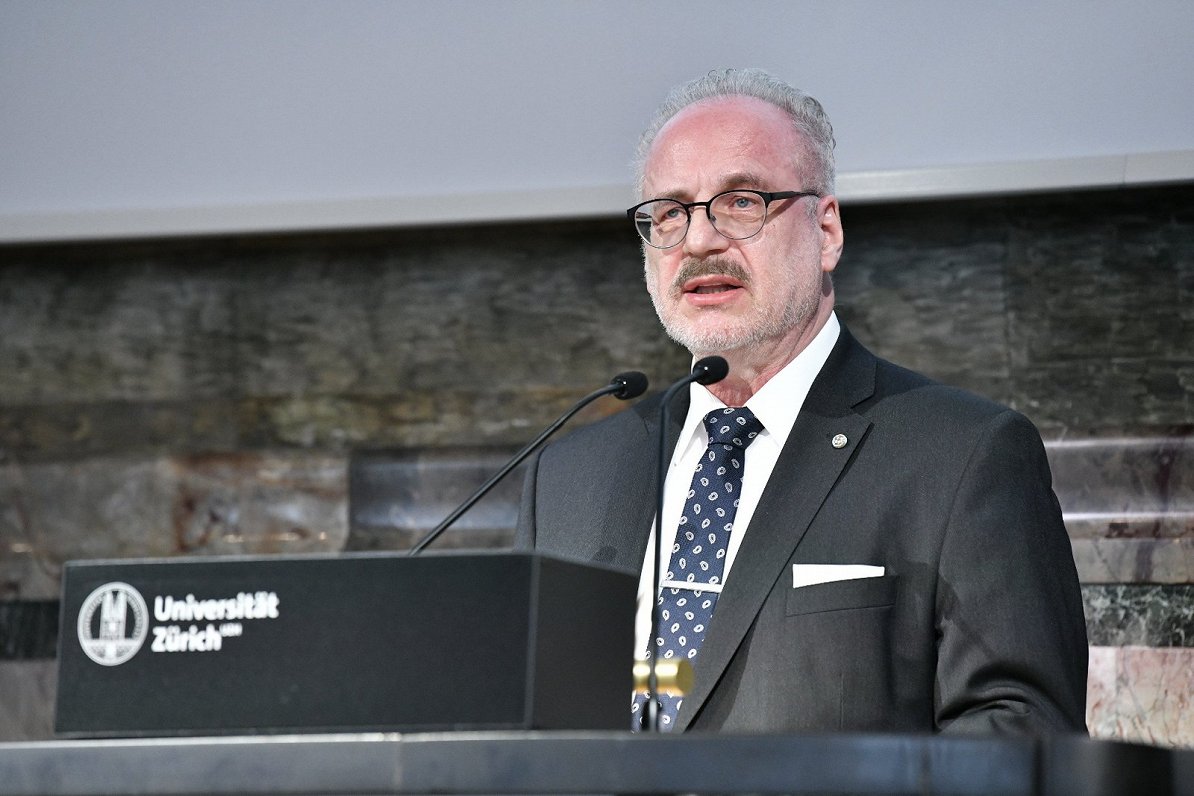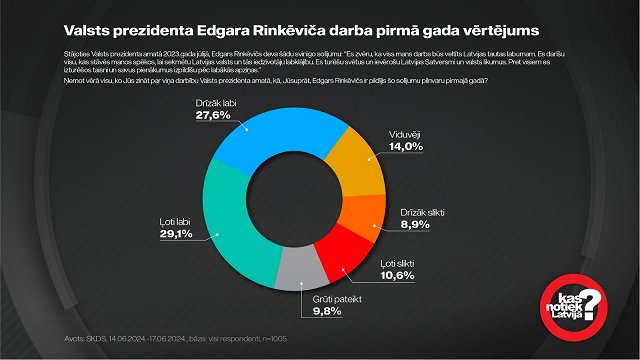Part of the itinerary was an opportunity to deliver the annual "Churchill lecture" at the University of Zurich. The annual Churchill Symposium was launched in 1996 on the fiftieth anniversary of Sir Winston Churchill's famous speech in Zurich. This year's symposium was supported by Swiss private banking group Julius Baer.
The text of President Levits' speech is reproduced below. Its starting point is an analogy between the most important historic events and volcanic eruptions.
INTRODUCTION
I
Europe and the world are in a time of historic turmoil. I would compare it to a volcanic eruption.
When a volcano erupts, a stream of hot lava covers the entire volcanic area. Hot lava transforms everything. Nothing is left of the current landscape.
But soon after, the lava hardens and forms a new topography, a new landscape that remains unchanged for a long time. Until the next eruption.
II
It's the same with history. In the great moments of history, which can be compared to volcanic eruptions, old countries perish, new states are born, new political systems emerge, and a new international order forms.
There have been three such volcanic eruptions in history in the 20th century.
The first eruption occurred after World War I when two European empires collapsed, and nine new states emerged in Europe.
The second was in 1945 when a new map of Europe was created and the Iron Curtain divided the world.
This curtain divided Europe in half. One part, including Switzerland, was on the side that could live according to the principles of democracy. The other part, including my country, Latvia, became hostage to a totalitarian ideology.
Finally, in 1990, when the political map of Europe was redrawn for the third time. This order, which existed until Russia's invasion of Ukraine in February 2022, was characterized by self-determination, democracy and freedom.
However, at the same time, we also observed a certain naivety and carelessness, arrogant self-confidence and illusions about the universality and sustainability of the idea of human rights and freedom.
And now, in 2022, we are currently witnessing the first eruption of this century’s volcano of history. We are witnessing the birth of a new era, a 'Zeitenwende'.

III
While the hot lava of the volcano is still soft, it can be formed.
In times of geopolitical turmoil, political ideas and the stance of politicians, countries and civil society have a significant impact. They create the reality of life for the ensuing peaceful times.
For Western democracies, this time of eruption is also a time of opportunity. A time for re-assessing values, discarding illusions, and thinking creatively.
I can assure you, this period will be brief. Afterwards, for many decades to come, we will live in the world we shaped in these months, and in this year.
Our task is to ensure that this short window of time, when everything is still in flux, does not become what political scientists and historians will one day call the beginning of the rapid decline of democracy.

IV
This series of traditional lectures were begun by Winston Churchill — a politician who influenced and shaped the future of Europe for a long time.
Here at the University of Zurich, on 19th September 1946, he said the famous words, "Let Europe arise!" It took an impressive geopolitical imagination to foresee the new landscape of European and global international order. It was only one year after the end of a devastating war between the European nations, at a time of fear and hatred.
Churchill not only hoped that Europe would be reborn but also offered a vision of how this could happen.
He spoke of a new community of European democracies, overcoming domestic self-interest and forging closer transnational ties.
It would protect free European countries from the aggressive expansion of the Soviet Union.
In his vision of a free Europe, he included Germany, whose Nazi regime had led to the devastation of World War II but was now taking its first steps towards democracy under the supervision of the Western Allies.
However, at the same time, Churchill accepted—or rather, was forced to accept—that the European nations behind the Iron Curtain, including Latvia, would remain under the rule of the totalitarian Soviet Russian Empire.
For us Latvians, and other nations, this meant another 45 years in devastating captivity.
THE WEST AS A COMMUNITY OF POLITICAL VALUES
V
Churchill's 1946 speeches at Fulton, in March, and here in Zurich, in September, marked a new geopolitical formation: the West—the countries of Europe and North America, united by a liberal democratic political system based on certain values, with a fundamentally universal character.
The West has existed already as a historical and cultural concept since the Middle Ages. It seems that it was first used by Martin Luther when he referred to Abendland as opposed to Morgenland. However, it only appeared as a specific category of geopolitics immediately after the Second World War.
VI
The ideological opposition between the West and the communist bloc during the Cold War left the world balancing on the brink of nuclear war until 1990.
At the same time, the threat from an expansive Soviet Russia, which had seized Central and Eastern Europe and potentially wanted to impose its socialist state system on the rest of the world, made Western democracies more deeply identify with their common cultural and intellectual roots and the value of their democratic political systems.
FREEDOM AS THE BASIS FOR WESTERN VALUES
VII
The international order of the Cold War ended between 1989 and 1991 when the third volcanic eruption of 20th-century history took place. The Soviet Russian Empire collapsed. The European captive nations regained their freedom. Latvia, Lithuania and Estonia restored the independence they had lost in 1940 as a result of the illegal Hitler-Stalin pact.
Democracy as a form of government was established in virtually all of Europe, for a short period of time even in Russia, and in many other countries around the world, in particular in Latin America. The bipolar world changed into a multipolar world. Globalization ruled both the economy and the information space.
I would like to emphasize that the independence movements of Latvians, Estonians and Lithuanians played a major role in the downfall of the Soviet Russian Empire and thus in this turning point of history.
VIII
The inspiration and driving force of this third major historical eruption of the twentieth century was freedom.
The idea of freedom has universal appeal. It is based on the individual's natural desire for autonomy, the right to decide for oneself. Freedom is the opposite of a determinist worldview.
The idea of freedom is not static. It is a dynamic interaction with social customs, norms and laws. Moments of historical breakthroughs most clearly shed light on people's perceptions of the freedom of will and freedom of action. These moments illuminate people’s willingness to accept or to reject a particular regulatory framework in which to exercise their freedom.
DEMOCRACY AS A FORM OF GOVERNMENT IN WHICH INDIVIDUAL FREEDOM CAN BEST BE EXERCISED
IX
The idea of freedom is the central axis of the modern West. It is the individual's desire for freedom that has created the basis of the Western democracies to provide the best political framework for the practice of freedom.
The political and legal history of the Western world is a long series of efforts to find the best balance between protecting the freedoms of each individual and meaningfully harmonizing the freedoms of different individuals.
A democratic state governed by the rule of law in the form of government that best allows everyone's freedom to be exercised.
RUSSIAN SELF-AWARENESS AS AN ALTERNATIVE TO EUROPE
X
Russia has a different historical experience. Since the time of Ivan the Terrible, the Kremlin has always claimed to represent an alternative European history.
In their opposition to the Western world, Russian rulers have always argued that Western values—personal freedom, human dignity, and democracy—are not universal and are not suitable for Russia.
Putin continues this historical narrative. The aim of the Russian invasion of Ukraine is to restore its autocratic empire, the disintegration of which began after the First World War.
As former US national security advisor, Zbigniew Brzezinski, famously said, “Without Ukraine, Russia ceases to be an empire”.
Russia began to rebuild the empire in 2008 after a military invasion of Georgia. The annexation of Crimea in 2014 and the war in Donbass, along with the invasion of Ukraine that began on 24th February this year, is a continuation of this narrative.
Putin wants to make history as the man who restored the Russian Empire which could also play the role of a hegemonic power over the whole of Europe.
XI
However, this has never been the vision of the nations brutally conquered by the Russian Empire—the Poles, Finns, Latvians, Lithuanians, Estonians, Ukrainians, and others.
To illustrate this, I would like to mention the honourable Latvian statesman Miķelis Valters (1874-1968),whose life was closely connected with Switzerland. In 1907 he obtained his doctoral degree in state sciences (Staatswissenschaften) here at your university – the University of Zurich.
Miķelis Valters described the Russian Empire as a prison of individuals and nations.
In order to ensure the freedom of the individual, he saw only one solution—the destruction of the Russian Empire and the creation of individual nation-states belonging to the Western world.
In 1903, in the Latvian revolutionary newspaper ‘’Proletarian’’, published here in Switzerland, he wrote a conceptual article on the transformation of Russia. It formulated, for the first time, the Latvian nation's demand for its own state. He concluded his article with the call: “Down with Russia!”The geopolitical landscape that emerged after World War I allowed Latvians to bring Valters’ vision into reality.
WESTERN ILLUSIONS
XII
After the collapse of the Soviet Union in 1991, and the disappearance of the ideological adversary of the Cold War, the new ‘Zeitgeist’ was embodied by Francis Fukuyama's theory of the end of history.
Fukuyama was convinced that the bankruptcy of the Soviet block means the ultimate victory of liberal democracy and the free market. There was the belief that the export of liberal democracy was both possible and inevitable. A position that has been maintained for many years by Western political elites and international organizations.
Until the end of the second decade of the 21st century, the prevailing ideology was that Russia would be transformed through engagement. The West believed that Russia's ‘Wandel durch Handel’ was possible.
XIII
I would like to emphasize that Fukuyama's theory proved irrelevant because it was based on a faulty premise. Instead of individual freedom and the rule of law, the values of a consumer society were wrongly seen as the driving force which would transform an authoritarian system into a liberal democracy.
Yes, freedom and justice make it possible for people to live in prosperity, but prosperity and the free market do not always create freedom and justice. We see many examples in the world.
SELF-DEFENDING DEMOCRACY
XIV
We often see the privileges of democracy as a self-evident, enduring benefit. They seem as natural as the air we breathe. However, we do not think about the air on a daily basis. And we only become aware when it has already been polluted.
Democracy is not guaranteed once and for all. I would like to recall the words of Konrad Adenauer, the Chancellor of the Federal Republic of Germany, when he said, “democracy is always under threat”.
Democracy must be nurtured and safeguarded. Israel's Chief Justice, Aharon Barak, has said that if democracy could collapse in the Germany of Kant and Beethoven, no one is safe.
XV
Yet democracy is not helpless. Modern constitutional democracy also includes the concept of self-defending democracy. In German ‘wehrhafte Demokratie’.
Self-defending democracy means that the freedoms guaranteed by democracy can not be used to undermine democracy itself. Public institutions and citizens have a duty to defend and safeguard democracy against its threats.
That is the essence of the concept of a self-defending democracy.
Prior to World War II, the democratic constitution of the Weimar Republic did not have such a defence mechanism. It was believed that in a democracy the majority has unlimited rights.
Indeed Joseph Goebbels, as ‘Reichsminister’ of Propaganda, reminded the world that – I quote – “it will always remain the best joke of democracy, that it gave its mortal enemies the means by which it was destroyed”.
XVI
But we have learned from the Weimar experience. Modern democracy is not and must not be toothless.
After Russia's invasion of Ukraine, European countries are closing their information space to the Kremlin’s propaganda TV channels. This is not a restriction on the freedom of expression, because these channels are not the media, but rather weapons being used in an information war against both Ukraine and the West.
Likewise, I welcome the European Parliament's call for a ban on European political parties from receiving funding from third countries in order to prevent them from undermining democracy.
XVII
The democratic state is not a self-evident product of historical development. It has been in operation for a historically short time and in a relatively small part of the world.
Democracy is far from being perfect. However, a democratic state governed by the rule of law is the only form of state that is aware of its own mistakes and own shortcomings. By ensuring the free flow of thoughts and ideas, it is able to learn from its failures, adjust its course, and improve itself.
Sometimes it's slow. But in the long run, it is a system which allows us to find better solutions.
In autocratic and totalitarian regimes, decisions can be made more quickly. But this efficiency is at the expense of individual freedoms.
However, the imagined stability of these authoritarian regimes is often an illusion. A totalitarian regime is like a glass wall that encapsulates a person's desire for freedom. When touched, the glass appears to be solid. But by striking the glass in the right place, it breaks into pieces.
The history of Russia is an example of this.
THE SOLIDARITY OF DEMOCRACIES
XVIII
At the same time, Russia's challenge to the international order represents a challenge to the Western moral universe, centred on the notion of freedom.
Anne Applebaum recently wrote: “There is no natural liberal world order, and there are no rules without someone to enforce them. Unless democracies defend themselves together, the forces of autocracy will destroy them.”
Every action and inaction will affect the outcome of Russia's war against Ukraine. The outcome of the war will in turn affect the geopolitical landscape of the future for decades.
XIX
Russia does not respect countries that are militarily and politically weak and lack the will and ability to defend themselves and their allies.
Therefore, it is not the strength of the West and NATO that provokes Russia, but rather its weakness.
That is why appeasement of Russia is counterproductive. In recent months, this was once again demonstrated by the futile efforts of some Western politicians to persuade Putin to abide by international law.
Russia respects only determined will and strength. It does not respect those who try to please and flatter. It is the weakness of the West that provokes Russia to go further.
XX
Today, the world can follow Russia's war against Ukraine online. This has resulted in global moral outrage. It has created immense values-based solidarity and demand for action from politicians.
The task of politicians is not to describe what kind of crime Russia is committing in Ukraine. This is the task of analysts and commentators or journalists. The task of politicians is not to condemn Russia for the hundredth time. It is enough ten times.
The task of the politicians is to act. To help Ukraine to stop Russia.
Our solidarity will help Ukraine to recover. At the same time, it will also help the West to recover as a community of values.
XXI
Ladies and gentlemen!
We have four interlinked tasks that need to be carried out immediately: to support Ukraine, to isolate Russia, to punish those who have committed crimes against humanity, and to strengthen democratic institutions and organizations.
First. Ukraine must be helped with military equipment, humanitarian aid, and the protection of refugees. As described by Timothy Snyder, Ukraine must not remain a Bloodland. No country in Europe wants and deserves to be a Bloodland! Ukrainians are fighting so heroically because they know what it means to live under Russian rule.
One day this war will end. And, I strongly believe, with the victory of Ukraine.
Ukraine will then need to rebuild its cities destroyed by Russian bombers and the fields ravaged by Russian tanks. Ukraine will deserve its very own Marshall Plan and its rightful place in Europe. This will not bring the thousands of innocent killed Ukrainians back to life, but it will be remembered for years to come that their fight was not in vain.
XXII
Second. As long as this aggressive autocratic regime is in power in Russia, Russia must be isolated—economically and politically.
Europe needs to break its dependence on the main lever of Russian political influence: oil and gas. Every euro we spend on Russian gas and oil finances the tanks and bombs that attack Ukrainian civilians.
Ukrainians are paying for their freedom with blood. We must be prepared to pay with increased costs and sacrifices in our comfort.
XXIII
Third. One of the cornerstones of democracy is the rule of law. Therefore, those responsible for the war crimes committed in Ukraine must be brought to justice sooner or later.
Not only Putin but also the whole chain of command down to physical perpetrators of the crimes. Ukraine has already started to identify them. No one can excuse himself with reference to an order of a superior.
The International Criminal Court in The Hague has already launched an investigation. In parallel, Ukraine filed a lawsuit against Russia at the International Court of Justice in The Hague.
On my initiative, Latvia has joined Ukraine's claim in the International Court of Justice and supports the investigation of Russian war crimes in the International Criminal Court. At present, Ukrainian refugees can testify at the Latvian Prosecutor's Office. Their evidence will be used in international courts.
Within the UN, and alongside with Switzerland, we have also recently joined the Group of Friends of Accountability Following the Aggression Against Ukraine. An independent International Commission of Inquiry has been set up by the UN Human Rights Council to investigate Russian war crimes and they will report by September.
The possibility of setting up a special international tribunal for Russia's crimes in Ukraine is also being discussed. Like a special tribunal for Yugoslavia or a special tribunal for Cambodia. And there are other examples. And I strongly support this idea.
It is important to show that aggressions have serious consequences and that aggression does not create rights. The investigation and detection of crimes by international courts could prevent similar aggression in the future. Aggression against another country must never be normalized, no matter how long it takes.
For too long, we have been weak in our efforts to assess the crimes committed by Russia, and the previous Soviet regime, against its peaceful neighbouring countries and against their own population. However, now, all roads must lead to The Hague!
XXIV
Fourth. We need to strengthen the institutions of democracy at home and the ability of Western countries to defend themselves. We need to strengthen the international organizations that ensure all countries, in particular, the opportunity to participate in decision making and global engagement.
I also welcome the Summit for Democracy, initiated by US President Joe Biden, which took place for the first time at the end of last year. It promotes closer cooperation between the world's democracies, of which there are around 100 of different quality, in order to defend their values and to play a more visible role in the international order.
Nevertheless, as we have seen in today’s world, goodwill, international law, and soft power are not enough to safeguard our values and our democracies. They must be backed by military force when needed.
NATO is the strongest military alliance in history and has maintained peace in the North Atlantic region for over three-quarters of a century. The end of NATO through a loss of purpose or fracturing of interests has been predicted many times. Last time, I think, two or three years ago from the President of France. Yet we see today that NATO is more united and stronger than it has ever been.
Russia's misguided and violent venture in Ukraine may not be the last or even the most dangerous threat to the rules-based international order. We must do all we can to strengthen the solidarity of democracies across the world, promote the cohesion of the European Union, and increase the defence capacity of NATO.
CONCLUSION
XXV
Ladies and gentlemen!
We feel change simmering in the air, but we do not yet see what it will look like. Winston Churchill once stood and spoke here in a similar atmosphere of change.
What would we tell him today—that the Iron Curtain fell, only to return in a slightly different location? Will we passively stand aside and watch the lava harden, creating a new European landscape where Ukraine no longer exists, and Europe is dominated by autocratic Russia?
The post-Cold War era in Europe is over. Democracy’s naivety and illusions have vanished.
However, Western liberal democracy must not surrender. We must not allow Putin's Russia to shape the future of Europe.
Our strength is based on our freedom, our rule of law, and our solidarity of democracies. Our strength is based on the appeal of our way of life in a democracy and our willingness to defend it!





























